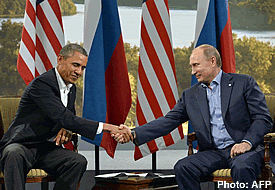Then POTUS snubbed the bilateral summit with Russian President Vladimir Putin in Moscow coinciding with the Group of 20 in St Petersburg in early September. The Kremlin was equally "disappointed."
Brechtian distancing tells us that "ridiculous" does not even begin to describe it. The Cold War mentality is actually impregnated in the Beltway genes -- from Capitol Hill to the Pentagon. As for POTUS, he acted like a diplomatic dilettante at best. "Yes, We Can" has morphed into "Yes, We Scan"; and now it's "Yes, We Scorn." This may apply to assorted poodles of European breeding, but it won't stick to Vlad the Hammer.
The White House justified its decision by "lack of progress" on everything including missile defense, arms control, trade and commercial relations, global security issues, human rights and civil society. Nonsense; this was all about an impotent POTUS prevented from prosecuting his war against whistleblowers. Putin's foreign affairs adviser, Yury Ushakov, was closer to the truth when he said, "The US is not ready to build relations on an equal basis."
Vlad the Hammer can sense a wimp of Carter-esque proportions like a polar bear hunting a seal. He quickly evaluated how the Obama administration turned its already shaky credibility to ashes on two simultaneous fronts; because of the scale of the Orwellian/Panopticon complex detailed by Snowden's leaks, and because of the way he was being mercilessly hunted.
Adding a few more nails in the coffin of mainstream media, the New York Times posted an editorial -- arguably "suggested" by the White House -- justifying the cancelation of the summit, saying, "Mr Putin is a repressive and arrogant leader who treats his people with contempt."[2] Right; and Snow White lives in the White House.
All aboard the Trans-Siberian
POTUS's adolescent tantrum has nothing to do with Cold War. For starters, the US and Russia are mutually dependent on a vast array of issues. At least in theory, some adults will be discussing them in Washington this weekend, as Russian Foreign Minister Sergei Lavrov and Defense Minister Sergei Shoigu meet with US Secretary of State John Kerry and Pentagon head Chuck Hagel.
Vlad just needs to say the word to turn the already humiliating US/NATO withdrawal from Afghanistan -- as in having their asses kicked by a bunch of Pashtuns with fake Kalashnikovs -- into a cataclysmic disaster.
Vlad can subtly calibrate Russia's support for Bashar al-Assad in Syria -- especially after Saudi intelligence chief Prince Bandar "Bush" bin Sultan paid him a visit in Moscow and allegedly offered to buy loads of Russian weapons as long as Russia backed off.[3] Putin was not impressed. Still, Bandar would not have done that without "consulting" with his US masters.
Vlad can offer plenty of extra diplomatic support for the new Rouhani presidency in Iran -- including, crucially, new weapons sales, and solidify Tehran's position in possible negotiations with Washington.
In the Caucasus, Vlad is on a roll. Georgia is way less antagonistic towards Moscow. And in Pipelineistan, Russia influenced Azerbaijan's decision to privilege the Trans-Adriatic Pipeline (TAP) over the perennially doomed Nabucco West, and immediately moved to solidify energy cooperation between Azerbaijan's SOCAR and Russia's Rosneft. Both Georgia and Azerbaijan are considered as proverbial "staunch" US allies.
In Europe, every cruise ship pilot on the Rhine knows about Russia's strategic partnership with Germany. On negotiations on natural gas deals with Italy, France or Poland, for instance, the name of the Russian game is to secure long-term contracts with plenty of price breaks and tax schemes.
In Central and Eastern Europe Vlad is also -- what else -- on a roll, with Russia buying scores of strategic manufacturing, chemical and transport assets.
Then there's the crucial Trans-Siberian gambit. I did the Trans-Siberian twice, in winter, in the early 1990s and then in the late 1990s; it's one hell of a trip. At the time it was mostly about impoverished Russians buying everything in sight in China and wily Chinese selling everything they could in Russia. Nowadays it's all about heavy cargo. The Trans-Siberian moves no less than 120 million tons of cargo a year -- and counting; that's at least 13% of container trade between Europe and Asia. Russia is investing in a US$17 billion expansion and adding 55 million extra tons of cargo capacity.
Add to it tripling the capacity of Russia's Pacific coast terminals by 2020; the expansion of St Petersburg's port; Siemens supplying 675 extra cargo electric locomotives as part of a $3.2 billion deal.
(Note: You can view every article as one long page if you sign up as an Advocate Member, or higher).






